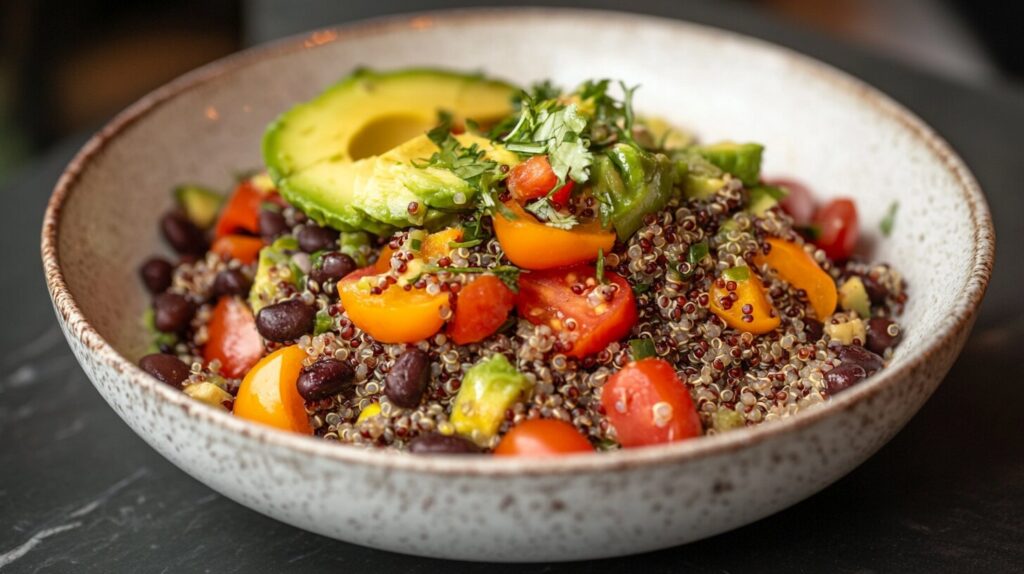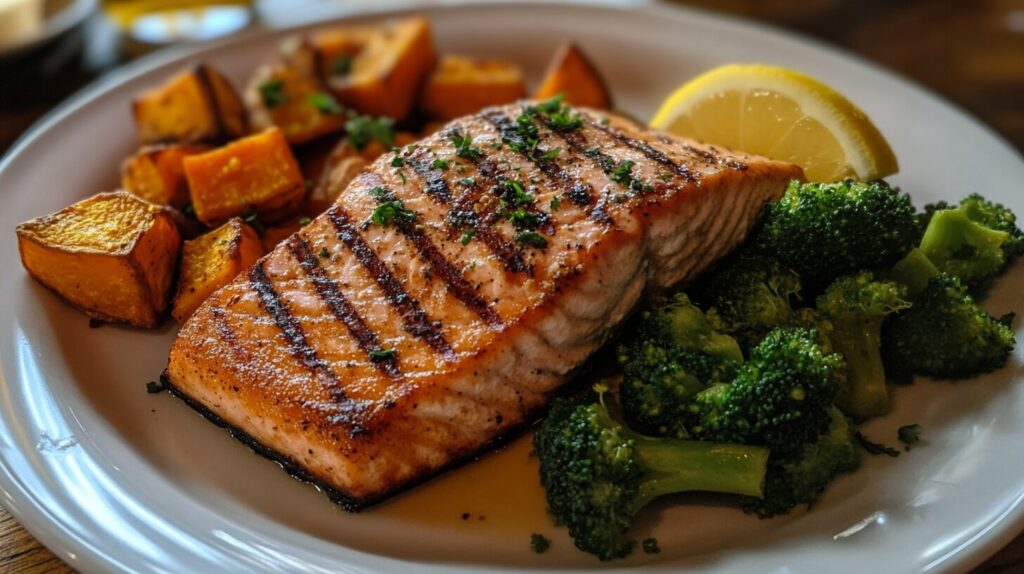PCOS (Polycystic Ovary Syndrome) is a condition that affects millions of women worldwide. If you’ve been diagnosed with it, you’re likely familiar with the frustrating symptoms: irregular periods, weight gain, acne, and sometimes, infertility. The good news? Managing PCOS isn’t solely about medication. Diet plays a massive role in controlling symptoms. But what exactly should you eat? What does a good meal plan for PCOS look like? Let’s dive deep into how the right foods can transform your health, energy levels, and overall well-being.
Table of Contents
Understanding PCOS and Its Impact on Health
Before we jump into meal plans, it’s essential to understand PCOS. Polycystic Ovary Syndrome is an endocrine disorder affecting hormone levels, leading to issues with metabolism and reproductive health. Women with PCOS often have higher levels of insulin, which can lead to weight gain and insulin resistance. This imbalance can also cause your body to produce more androgens (male hormones), leading to unwanted hair growth, acne, and thinning hair on your scalp.
Why You Should Care About Insulin Levels
Insulin resistance is one of the core issues of PCOS. When your body becomes resistant to insulin, your pancreas compensates by producing more. This excess insulin not only makes it hard to lose weight but also disrupts your hormones further. Keeping insulin in check is crucial—and your diet plays a starring role in that.
Block Quote:
“Think of insulin as a gatekeeper. When it works well, it lets sugar into your cells for energy. When it’s out of balance, it locks the gates, leading to chaos in your body.”
H2: Why Diet Plays a Critical Role in PCOS Management
You might be wondering, why is diet such a big deal for PCOS? Well, food directly impacts your hormone levels, weight, and insulin sensitivity. A balanced diet can help:
- Regulate your menstrual cycle 🗓️
- Improve fertility
- Reduce acne and hair growth
- Promote weight loss
And the best part? You don’t need any extreme, unsustainable diets. Simple changes can yield incredible results.
Components of a Healthy Meal Plan for PCOS
Designing a good meal plan for PCOS isn’t rocket science. It’s about understanding your body’s needs and feeding it the right mix of nutrients. A balanced PCOS meal plan should include the following components:
Balancing Macronutrients for Hormonal Balance
Macronutrients—carbs, proteins, and fats—are the building blocks of your diet. The trick for PCOS is to balance these correctly. Here’s how:
- Carbs: Go for low glycemic index (GI) carbs like whole grains, sweet potatoes, and legumes. These don’t spike your blood sugar like refined carbs do.
- Proteins: Include lean proteins like chicken, fish, eggs, and plant-based options like beans and tofu. Proteins help you feel full longer.
- Fats: Don’t fear healthy fats! Avocados, nuts, olive oil, and fatty fish are excellent choices. They help balance hormones and keep inflammation down.
The Importance of Fiber in PCOS Diets
Fiber is your digestive system’s best friend. It helps control blood sugar levels and keeps you full. Aim for at least 25-30 grams of fiber per day. Good sources include:
- Oats
- Lentils
- Chickpeas
- Berries
- Vegetables (like broccoli and spinach) 🥦
Fun Fact: Fiber also helps with gut health, which is closely linked to hormone balance. A happy gut often means happier hormones!
How Proteins Support Hormone Regulation
Protein is a powerhouse nutrient for PCOS. It stabilizes blood sugar levels, promotes satiety, and supports muscle health. Some excellent protein sources are:
- Eggs (they’re not just for breakfast!)
- Lean meats like chicken and turkey
- Fish like salmon, rich in omega-3s 🐟
- Plant-based proteins like lentils and quinoa
Block Quote:
“Proteins are like anchors—they keep your blood sugar steady and prevent those dreaded energy crashes.”
Best Foods to Include in a PCOS Meal Plan
Now, let’s talk specifics! What are the superstar foods for PCOS? Here’s a breakdown of the best options:
Vegetables and Fruits for PCOS
Fruits and veggies should make up a significant part of your diet. They’re packed with fiber, antioxidants, and essential nutrients. Some top choices include:
- Leafy greens like spinach, kale, and arugula
- Cruciferous veggies like broccoli and cauliflower
- Low-sugar fruits like berries, apples, and pears 🍎
Tip: Aim to fill half your plate with non-starchy vegetables at each meal.
Whole Grains and Their Benefits
Whole grains are a fantastic source of slow-releasing energy and fiber. Unlike refined grains, they don’t cause sugar spikes. Consider adding:
- Quinoa
- Brown rice
- Whole-wheat bread
- Oats
These grains keep you full, support digestion, and help manage weight.
Lean Proteins for Better Health
As mentioned earlier, lean proteins are essential. They help repair tissues, balance hormones, and keep your blood sugar stable. Options to consider:
- Chicken breast
- Turkey
- Fish
- Eggs
For plant-based eaters, lentils, chickpeas, and tofu are great substitutes.
Healthy Fats and Why You Need Them
Healthy fats are crucial for hormone production. Don’t skip these! Include:
- Avocados 🥑
- Nuts and seeds (walnuts, chia seeds, flaxseeds)
- Fatty fish (salmon, mackerel)
- Olive oil
These fats help reduce inflammation and keep your cells functioning optimally.
Foods to Avoid for PCOS
While focusing on what to eat is essential, knowing what to avoid is just as crucial. Here are the culprits you should steer clear of:
Refined Carbohydrates and Sugars
Refined carbs and sugars are like fire starters for inflammation and insulin spikes. Avoid:
- White bread
- Pastries and cakes 🎂
- Sugary drinks (soda, sweetened teas)
Processed and Fried Foods
These foods are loaded with unhealthy fats, preservatives, and empty calories. Limit:
- Fast food
- Chips and crackers
- Fried snacks
Caffeine and Alcohol Intake
Too much caffeine and alcohol can mess with your hormones. While an occasional coffee or glass of wine is fine, moderation is key. Too much can:
- Increase stress hormones
- Worsen sleep quality
- Disrupt your menstrual cycle
What is a Good Meal Plan for PCOS?
Welcome back! In Part 1, we covered the foundations of a healthy PCOS diet, the best foods to eat, and what to avoid. Now, let’s roll up our sleeves and get practical. We’ll dive into sample meal plans, explore common challenges you might face, and offer actionable solutions to help you stay on track. 🍽️✨
Sample Meal Plan for PCOS
Creating a meal plan for PCOS doesn’t have to feel overwhelming. It’s all about balance, variety, and ensuring you get nutrient-dense foods at every meal. Here’s a simple 1-day meal plan to kick-start your journey to better health! 🥗
Breakfast Ideas for PCOS
Breakfast sets the tone for your entire day, so make it count! Focus on a balance of protein, fiber, and healthy fats.
- Avocado Toast with Eggs 🥑🍳
- Ingredients: Whole-grain bread, half an avocado, 2 poached or boiled eggs, sprinkle of chia seeds.
- Why it works: This combo gives you protein, healthy fats, and fiber to keep you satisfied and your blood sugar stable.
- Greek Yogurt with Berries and Almonds 🍓🥣
- Ingredients: 1 cup of unsweetened Greek yogurt, 1/2 cup of berries (blueberries or raspberries), a handful of almonds.
- Why it works: Packed with protein, antioxidants, and fiber. Plus, almonds provide healthy fats.
- Oatmeal with Chia Seeds and Cinnamon 🌾🍂
- Ingredients: 1/2 cup of rolled oats, 1 tablespoon chia seeds, 1/2 teaspoon cinnamon, 1 tablespoon almond butter.
- Why it works: Oats are a great source of soluble fiber, while cinnamon helps regulate blood sugar.

Lunch Options for a Balanced PCOS Diet
Lunch is your chance to refuel and maintain energy levels. Keep it balanced with proteins, complex carbs, and plenty of veggies.
- Grilled Chicken Salad 🥗🍗
- Ingredients: Grilled chicken breast, mixed greens (spinach, arugula, kale), cherry tomatoes, cucumber, a handful of walnuts, olive oil, and lemon dressing.
- Why it works: A protein-packed salad with healthy fats and fiber to keep hunger at bay.
- Quinoa and Black Bean Bowl 🍚🥑
- Ingredients: 1 cup cooked quinoa, 1/2 cup black beans, diced bell peppers, cherry tomatoes, avocado slices, and a sprinkle of lime juice.
- Why it works: Quinoa is a complete protein, and black beans add fiber and slow-digesting carbs.
- Turkey and Hummus Wrap 🌯🥒
- Ingredients: Whole-wheat tortilla, 3 slices of turkey breast, 2 tablespoons of hummus, spinach, and cucumber slices.
- Why it works: A protein and fiber combo that keeps insulin levels stable.

Dinner Recipes for Hormonal Health
Dinner should be light yet nourishing. Prioritize proteins and veggies with a small portion of complex carbs.
- Salmon with Steamed Broccoli and Sweet Potato 🐟🥦🍠
- Ingredients: Baked salmon filet, 1 cup steamed broccoli, 1/2 baked sweet potato.
- Why it works: Salmon is rich in omega-3s, which help fight inflammation. Sweet potatoes offer slow-releasing carbs.
- Tofu Stir-Fry with Brown Rice 🍲🥬
- Ingredients: Cubes of tofu, bell peppers, snow peas, and broccoli stir-fried with soy sauce and ginger, served over 1/2 cup of brown rice.
- Why it works: A great plant-based meal loaded with protein, fiber, and nutrients.
- Zucchini Noodles with Turkey Meatballs 🍝🦃
- Ingredients: Spiralized zucchini, homemade turkey meatballs, and tomato sauce.
- Why it works: Low-carb noodles combined with protein-rich meatballs make this a guilt-free comfort meal.

Healthy PCOS Snacks and Drinks
Let’s not forget snacks! Snacks help curb hunger between meals and keep blood sugar steady.
- Apple Slices with Almond Butter 🍏🥜
- Carrot Sticks with Hummus 🥕🥣
- Handful of Mixed Nuts 🥜
- Hard-Boiled Eggs 🥚
- Green Tea with a Slice of Lemon 🍋☕
These snacks are nutrient-dense, easy to prepare, and great for on-the-go munching.
Common Problems in Following a PCOS Diet
Sticking to a PCOS-friendly diet can be challenging. Life happens, cravings hit, and sometimes motivation wanes. Here are some common problems women face:
Struggles with Meal Planning and Preparation
Cooking three healthy meals a day can feel like a full-time job. If you’re busy, it’s easy to fall into the trap of ordering takeout or grabbing processed foods.
Emotional Eating and Cravings
PCOS often comes with cravings for sugar and carbs, especially during hormonal swings. Stress and emotions can drive you to seek comfort in food.
Social Situations and Eating Out
Dining out with friends or attending family gatherings can derail your healthy eating goals. Most restaurant options are high in carbs, sugars, and unhealthy fats.
Solutions to Overcome PCOS Diet Challenges
The good news? These challenges are totally manageable. Here’s how to stay on track:
Easy Meal Prep Strategies for Busy Schedules
- Batch Cooking: Prepare meals for the week on Sunday. Store portions in glass containers for quick grab-and-go options.
- Pre-Cut Veggies: Save time by washing and chopping veggies ahead of time. Store them in ziplock bags.
- Freezer Meals: Make and freeze dishes like soups, stews, and casseroles for busy days.
Pro Tip: Use a slow cooker or an Instant Pot to make meal prep a breeze! 🍲
Mindful Eating Techniques to Curb Cravings
Mindful eating helps you tune into your hunger cues and make healthier choices. Try these tips:
- Eat Slowly: Put your fork down between bites.
- Listen to Your Body: Are you actually hungry, or just bored or stressed?
- Drink Water: Sometimes thirst disguises itself as hunger. Stay hydrated! 💧
Navigating Social Situations and Eating Out
Eating out doesn’t have to wreck your progress. Stick to these simple rules:
- Look for Grilled Options: Choose grilled over fried.
- Ask for Dressings on the Side: Control how much you use.
- Skip the Bread Basket: Focus on the main meal.
Block Quote:
“Remember, it’s not about perfection. Progress, not perfection, is what counts. Small, consistent changes lead to lasting results.” 😊
What is a Good Meal Plan for PCOS?
We’ve covered the basics of a healthy PCOS diet, practical meal plans, and solutions to common challenges. In this final part, we’ll explore the role of supplements, lifestyle tips to support your meal plan, and how to track your progress effectively. Plus, we’ll answer some frequently asked questions to ensure you’re equipped with all the knowledge you need to thrive with PCOS! 🌟💪
The Role of Supplements in a PCOS Meal Plan
While a balanced diet is key, sometimes supplements can give you the extra boost your body needs. Here are some essential supplements that may support hormone balance and overall health for women with PCOS.
Important Vitamins and Minerals
- Inositol
- Benefits: Supports insulin sensitivity, improves ovulation, and reduces anxiety.
- How to Take: 2-4 grams daily (consult your doctor for the exact dosage).
- Vitamin D ☀️
- Benefits: Helps regulate insulin levels and supports mood and bone health.
- Sources: Sun exposure, fatty fish, and fortified foods. Consider supplements if deficient.
- Magnesium
- Benefits: Reduces inflammation, improves sleep, and supports insulin sensitivity.
- Sources: Dark leafy greens, nuts, and whole grains.
- Omega-3 Fatty Acids 🐟
- Benefits: Reduce inflammation and improve hormone balance.
- Sources: Fatty fish, flaxseeds, chia seeds, or fish oil supplements.
Herbal Remedies for PCOS Management
- Spearmint Tea 🍃
- Benefits: Helps reduce excess androgens (male hormones) and improves acne.
- How to Take: 2 cups daily for noticeable effects.
- Cinnamon 🍂
- Benefits: Supports blood sugar control and improves insulin sensitivity.
- How to Use: Sprinkle on oatmeal, smoothies, or in your coffee.
- Turmeric 🌼
- Benefits: Anti-inflammatory properties that can help with weight management and hormone balance.
- How to Take: Add to curries, teas, or take it in supplement form.
Block Quote:
“Supplements are like backup singers—they enhance the performance, but the main act is still your diet and lifestyle.”
Always talk to your healthcare provider before starting any new supplement, especially if you’re taking medication.
Lifestyle Tips to Support Your PCOS Meal Plan
Diet alone can make a significant difference, but combining it with lifestyle changes can supercharge your results. Here are some tips to create a holistic approach to managing PCOS.
Exercise and Physical Activity 🏃♀️
Regular exercise helps improve insulin sensitivity, reduces inflammation, and supports weight management. Aim for a mix of:
- Cardio: Brisk walking, jogging, swimming, or cycling for 30 minutes, 3-4 times a week.
- Strength Training: Weightlifting or bodyweight exercises like squats, lunges, and push-ups.
- Flexibility and Mindfulness: Yoga or Pilates to reduce stress and improve hormone balance.
Tip: Find an activity you enjoy so it doesn’t feel like a chore! Dancing, hiking, or even gardening counts.
Stress Management Techniques 🧘♀️
Stress can wreak havoc on your hormones and worsen PCOS symptoms. Manage stress with:
- Meditation or Deep Breathing: Just 5-10 minutes a day can calm your mind.
- Journaling: Write down thoughts and feelings to process emotions.
- Sleep: Prioritize 7-8 hours of quality sleep each night. Avoid screens an hour before bedtime.
Remember: Self-care isn’t selfish. It’s essential.
Building a Support System 🤝
Managing PCOS can feel overwhelming, but you don’t have to do it alone. Build a support system that includes:
- Friends and Family: Share your goals with loved ones for encouragement.
- Support Groups: Join online communities or local support groups for women with PCOS.
- Healthcare Providers: Work closely with doctors, dietitians, and counselors who understand PCOS.
How to Track Progress with a PCOS Diet
Tracking your progress helps you stay motivated and recognize what’s working. Here’s how to monitor your journey effectively:
Monitoring Symptoms and Improvements
Pay attention to how your body responds to dietary and lifestyle changes. Track improvements in:
- Menstrual Cycle Regularity: Is your cycle becoming more predictable?
- Energy Levels: Are you feeling more energized throughout the day?
- Skin Health: Notice any changes in acne or hair growth?
- Weight Management: Are you seeing steady, sustainable changes in your weight?
Using Food Journals and Apps 📱
Food journals can help you identify patterns and triggers. Apps like MyFitnessPal, Lose It!, or Yuka can help you:
- Track meals and nutrient intake.
- Monitor physical activity.
- Set reminders for hydration and supplements.
Consulting with Professionals 👩⚕️
Regular check-ins with your healthcare provider or a registered dietitian can help you fine-tune your meal plan and address any challenges. They can run blood tests to monitor:
- Insulin Levels
- Hormone Levels
- Nutrient Deficiencies
Block Quote:
“Progress isn’t always measured in pounds lost. Sometimes, it’s the energy gained, the confidence restored, and the knowledge that you’re taking control of your health.” 💪
Frequently Asked Questions About PCOS Meal Plans
What is the best diet for PCOS weight loss?
A diet rich in whole foods, low-glycemic carbs, lean proteins, and healthy fats is best for PCOS weight loss. Avoid refined sugars and processed foods to stabilize insulin levels.
Can I eat dairy if I have PCOS?
It depends on your body. Some women find dairy worsens their symptoms, while others tolerate it well. Opt for full-fat, organic dairy in moderation and see how your body responds.
Is intermittent fasting good for PCOS?
Intermittent fasting can help some women improve insulin sensitivity. However, it’s not suitable for everyone, especially if you have a history of disordered eating. Consult a healthcare provider before trying it.
How much protein should I eat per day?
Aim for 1-1.5 grams of protein per kilogram of body weight. For example, if you weigh 70 kg, aim for 70-105 grams of protein daily.
Can I eat carbs if I have PCOS?
Yes! The key is choosing complex, low-GI carbs like whole grains, legumes, and vegetables. Avoid refined and sugary carbs to keep insulin levels stable.
Will a PCOS diet improve my fertility?
Yes, a balanced diet can help regulate your hormones, improve ovulation, and increase your chances of conceiving. Combine it with exercise and stress management for the best results.
Explore More Healthy Recipes and Tips! 🌱
Looking to expand your collection of PCOS-friendly recipes and healthy living tips? Check out these helpful guides:
- Delicious and Nutritious PCOS Recipes for a Healthy Lifestyle – Discover a variety of tasty recipes tailored to support hormone balance and overall health.
- Rice Cakes: Benefits and Recipes for Healthy Snacking – Learn how rice cakes can be a quick, healthy snack option.
- Matcha Muffin Recipe with Almond Flour: A Healthy and Delicious Treat – Indulge in a guilt-free treat that’s low in sugar and high in nutrients.
- 7-Day Easy Anti-Inflammatory Meal Plan – Reduce inflammation and support your wellness journey with this easy meal plan.
These resources are packed with tips, ideas, and delicious recipes to keep you inspired and on track! 💪🥗
Conclusion: The Key to Thriving with PCOS
Managing PCOS isn’t just about following a strict diet—it’s about creating a sustainable, balanced lifestyle. By incorporating the right foods, managing stress, exercising regularly, and considering helpful supplements, you can take control of your symptoms and thrive.
Remember: Progress takes time. Be patient, stay consistent, and celebrate the small victories along the way. Your journey to better health is worth it! 🌟
